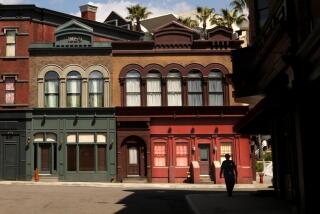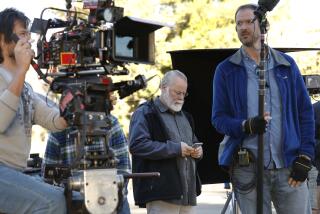Lawsuit Rises From Toppling of a Castle
- Share via
Castles were easier to build in the old days, when besieged barons and defiant dukes had no bigger worries than battering rams--not elections, bureaucrats and politicians.
At least that’s the attitude of Western Renaissance Pictures, which has asked the Los Angeles City Council to reimburse it for $85,000 because it was prevented from completing a movie-set castle in the dry lake bed of Chatsworth Reservoir.
The council is scheduled to meet in executive session Tuesday to discuss the claim.
The film company had barely sunk the main poles to support the castle facade for the movie “Army of Darkness” in April when a building inspector, acting on a complaint from City Councilman Hal Bernson, ordered work shut down, saying the company lacked a valid film permit.
Western Renaissance was forced to move its castle to Acton--”two-thirds of the way to Palmdale,” complained production manager Eric Gruendemann--at a cost of more than $85,000, including $2,736 in additional travel expenses, the company said.
Subsequently, Western Renaissance filed a claim against the city for what the company regards as needless losses at the hands of electioneering politicians and a confusing bureaucracy.
The script for “Army of Darkness,” about a 20th-Century “regular guy” who gets transported back to the Middle Ages, called for a castle with 150 feet of external castle wall, interior courtyard, working drawbridge and a moat.
What better place to build such a castle, the production company reasoned, than the old lake bed of Chatsworth Reservoir, dry now for more than 20 years. The company secured permission from the Department of Water and Power, which owns the lake bed, and paid for a city filming permit from the Department of Public Works.
But no sooner had the company begun work on the castle than a citizen complained to Bernson’s office, which notified the Department of Building and Safety.
“I went out to the site,” Building Inspector David Keim said. “They applied for a film permit, but the permit had not been issued.”
“That is incorrect,” Gruendemann said. “We paid the money. It existed and was in force. We just didn’t have it in our hands. They told us we didn’t need it for construction. And shooting was eight weeks off at that point.”
That makes no difference, Keim countered. In order to make any use of a film site, one has to have a permit in hand.
Besides, Keim said, the dry reservoir has been designated by zoning ordinance as an open area. “They couldn’t use it without a special permit issued by the city Planning Department and that had not been applied for or issued.”
Which annoys Gruendemann, who maintains the film company did everything that any film company ever does when getting permission to shoot. “You contact the landowner and you get a film permit to do what you need to do, and you’re set.”
The real problem, Gruendemann alleged, was that construction started just before the April election.
“We started building on April 1. We were shut down April 4. The election was the following Tuesday. A few constituents were worried that there was some kind of building going on. We had every right to be there. It was just sort of a way for Hal Bernson to do an eleventh-hour grandstanding move to make his constituents happy before the election.”
More to Read
Only good movies
Get the Indie Focus newsletter, Mark Olsen's weekly guide to the world of cinema.
You may occasionally receive promotional content from the Los Angeles Times.










